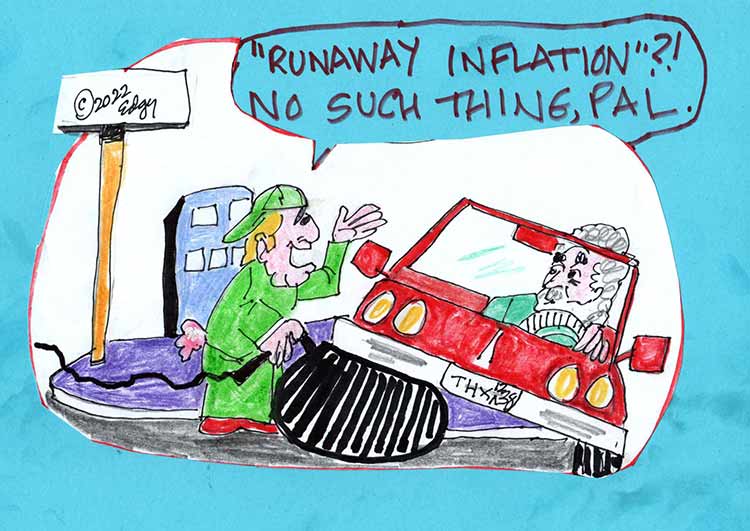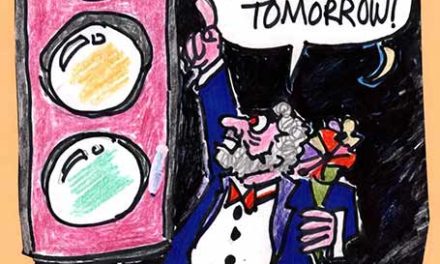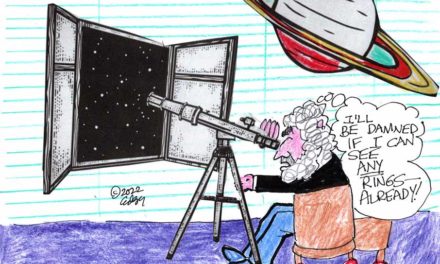Is Inflation Taking An (Increased) Toll On You?
We raise the ante on some familiar titles and expressions
By Ed Goldman
My parents thought this slightly doctored nursery rhyme was a laugh riot when I was a kid:
“Peter Peter pumpkin eater
Had a wife and could not keep her,
Put her in a pumpkin shell
‘Damned inflation,’ Peter said.”
Over-Tired
I didn’t get it then, nor do I now. But the tacit implication in the original poem—which ends, “There he kept her very well”—is that Peter Peter would not only put his wife into a pumpkin shell but also possibly consume her. If that’s the case, I think the Woke police might want to turn their focus away from Dr. Seuss and think about Peter Peter. And maybe call in members of the #Metoo movement, while they’re at it.
Inflation, which has always been with us but often in the background or in the fevered nightmares of economists, has again reared its ugly head—or heads, if you will. This tine around, I’m expecting it to find its way into popular culture and day-to-day expressions as well:
- “Thanks a million-five.”
- Fifteen-hundred Island salad dressing
- “You’ll get not one red nickel out of me!”
- The Dollar-Ten Store
- “The night has 2,000 eyes”
- Bellhop: “I’ll show you to your 50-cent pieces.”
- Car salesperson: “These brakes let you stop on a quarter.”
- Workplace Braggart: “That’s why I’m paid the big fivers.”
- “May I put in my own three-point-four cents?”
- Classic Bo Derek comedy: “11”
- Classic family comedy: “Cheaper by the Bakers Dozen”
- Western saloon brawl prelude: “Okay, you five-flusher, go for your seven-gun.”
- “Star Wars” robot: C-Fourpio
- Yuppie parent: “We just hired an au-trey to watch our kid.”
- Dave Brubeck’s immortal album: “Take Six”
- “I’ll pick up some sodas at the 8/12 minimart.”
- Iconic rock-and-roll bands: The Fab Five; The Dave Clark Six
- Classic western: “The Magnificent Eight”
- Classic Fellini film: “Nine-and-a-Half”
- Classic TV show: “Triplet Peaks”
- John Hughes’s coming-of-age film: “Seventeen or More Candles”
- Song lyric: “Two is the loneliest number that you’ll ever do”
- Film comedy: “Four Men and a Baby”
- TV comedy: “Three-and-a-Half Men”
- Trenchant movie drama: “Several Good Men”(featuring the memorable Jack Nicholson line, “A number of you can’t handle a couple of truths”)
- Nicholson again: “Two Flew Over the Cuckoo’s Nest”
- Three top dramas: “The Taking of Pelham 4,5,6”; “One-Dark-Thirty-One”; “Thirteen Angry Men” (one’s a jury alternate, which is why he’s so angry)
- “102 Arabian Nights”
- “Goldilocks and the Four Bears”
- “Eight Brides for Eight Brothers”
- “Love Potion Number Ten”
- “Nine Days a Week” and “When I’m 68” by the Beatles (also known as the Fab Five);
Big news! Clinique is now on Amazon.
The #1 dermatologist guided skincare and makeup brand is on Amazon Premium Beauty for the first time. Shop trusted formulas across skincare, makeup, fragrance, and men’s products.
- Paul Simon’s lilting “Fifty-six Ways to Leave Your Lover”
- Dolly Parton’s workplace lament, “Ten to Six”
- The marvelous Shania Twain’s “You’re Still the Two”
Ed Goldman's column appears almost every Monday, Wednesday and Friday. A former daily columnist for the Sacramento Business Journal, as well as monthly columnist for Sacramento Magazine and Comstock’s Business Magazine, he’s the author of five books, two plays and one musical (so far).
Yes, Virginia
A Weekly Blog by Virginia Varela
President, Golden Pacific Bank, a Division of SoFi Bank, Inc.
photo by Phoebe Verkouw
Where have all the community banks gone?
In the last 30 years, the total number of U.S. bank charters has declined from about 14,000 banks in 1992, to fewer than 5,000 in 2022—that’s more than 65 percent, according to the FDIC reports.
Most of the disappearing banks were actually acquired by other banks and the result are larger and more consolidated institutions.
There are many reasons for this industry consolidation. I contend that a large reason is because it’s so difficult to be technology savvy, to effectively compete, and to comply with numerous regulations and policies as a small community bank.
While all this is true, there is something sad about losing this business model. Like the local corner bakery or the mom-and-pop hardware store, our way of doing banking is constantly changing. It won’t be going back to what was.
I have been in banking for more than 30 years and watched it change and evolve. I love community banking—but as I experience becoming part of a larger organization, I recognize that sometimes small is not always better.
“Small Is Beautiful: A Study of Economics As If People Mattered” is a collection of essays published in 1973 by German-born British economist E. F. Schumacher. The title “Small Is Beautiful” came from a principle espoused by Schumacher’s teacher Leopold Kohr (1909–1994) advancing small, appropriate technologies, policies, and politics as a superior alternative to the mainstream ethos of “bigger is better.”
Overlapping environmental, social, and economic forces such as the 1973 energy crisis and popularization of the concept of globalization helped bring Schumacher’s Small Is Beautiful critiques of mainstream economics to a wider audience during the 1970s. In 1995, The Times Literary Supplement ranked Small Is Beautiful among the 100 most influential books published since World War II. A new edition with commentaries was published in 1993.
My point is that the notion of small being better is still sound in certain circumstances. But we often equate large with impersonal, and that’s a fallacy. A large business still consists of individuals; and when they’re caring individuals—people who’ll never make their customers feel small—size really doesn’t matter. Because the heart and soul of a company—its leadership and employees—are what will make it successful.
sponsored content













